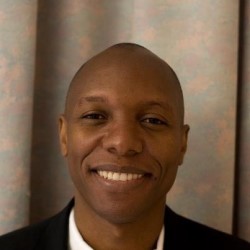|
Witnessing to hope in the midst of hopelessness
P. Jean Denis Saint Félix, SJ (GLC)
 Although I was born and raised in Haiti, I was not fully aware of the dire realities of my own people until I left my country in November 1993 for Panama, where I lived for two years as a novice. There I discovered the starkest contrast I have ever seen in my life. Only one hour from Punta Paitilla, one of the most luxurious places on earth, there was a small community called Primavera where even drinkable water was a luxury. In Boquete, Panama, in the province of Chiriquí, I encountered a quiet, peaceful and highly civilized indigenous population called Los Ngöbe, who were hardly considered human beings by the rest of the Central American population and were subjected to humiliation and discrimination. Although I was born and raised in Haiti, I was not fully aware of the dire realities of my own people until I left my country in November 1993 for Panama, where I lived for two years as a novice. There I discovered the starkest contrast I have ever seen in my life. Only one hour from Punta Paitilla, one of the most luxurious places on earth, there was a small community called Primavera where even drinkable water was a luxury. In Boquete, Panama, in the province of Chiriquí, I encountered a quiet, peaceful and highly civilized indigenous population called Los Ngöbe, who were hardly considered human beings by the rest of the Central American population and were subjected to humiliation and discrimination.
Read more...
In El Salvador I was moved by the enormous divide and the many scars caused by the civil war of the 1980s. I have never seen so many disabled people - crippled during the war. I worked for five years in the province of Chalatenango where at least two members of every family were missing. They were engulfed in the deadly engrenage (spiral) of the war machine.
In Honduras I had the opportunity to work with the Garifuna, a community totally forgotten by the Honduran state and with little access to basic education and services. The Honduran society at the time was torn by gun violence. Guns were everywhere and constituted a real challenge to peace and development.
When I went back to Haiti, I was properly equipped to understand the explosiveness of the structural violence based on this huge and scandalous gap between a tiny minority that owns the goods and the means of the country and a vast majority that struggles every day for survival. The Haitian people are basically taken hostage by the political, economic and intellectual elite, who impose corruption, indecency and impunity as the sole rule on the island. It is also impossible not to feel extremely disturbed by the inhuman treatment that my Haitian brothers and sisters are still subject to today in the Bateyes in the Dominican Republic. I currently serve in the United States, and I'm angered by the history of racial discrimination that continues to characterize American society.
I am upset by the humiliation, the misery, the injustice and the violence in which the majority lives its day-to-day life. Most of the time in these places, hope is a very hard word to utter without feeling that you are insulting people.
However, in the middle of these unspeakable realities, I was always consoled first by the courage and gratefulness, the faith and love, the fundamental goodness and the genuine solidarity of all those people I've served. Second, I was and am still very much edified by the radical commitment of people like Monseñor Óscar Romero, Ignacio Ellacuría and his companions, and Dean Brackley in El Salvador; by the witness of Fr. Juanito in Honduras; and by the gentle and loving presence of Fr. Godefroy Midy and Fr. William Smarth with the Haitian people. The honesty, simplicity and pastoral approach of Pope Francis is also a real and powerful inspiration for me.
I continue to fight and pray for a more just and humane society. I hear more and more the need to respond to the call of the church and the Society to participate in the effort to restore relationships among human beings from all backgrounds, to heal our relations with nature and, by doing so, to live more harmoniously with God the creator.
|